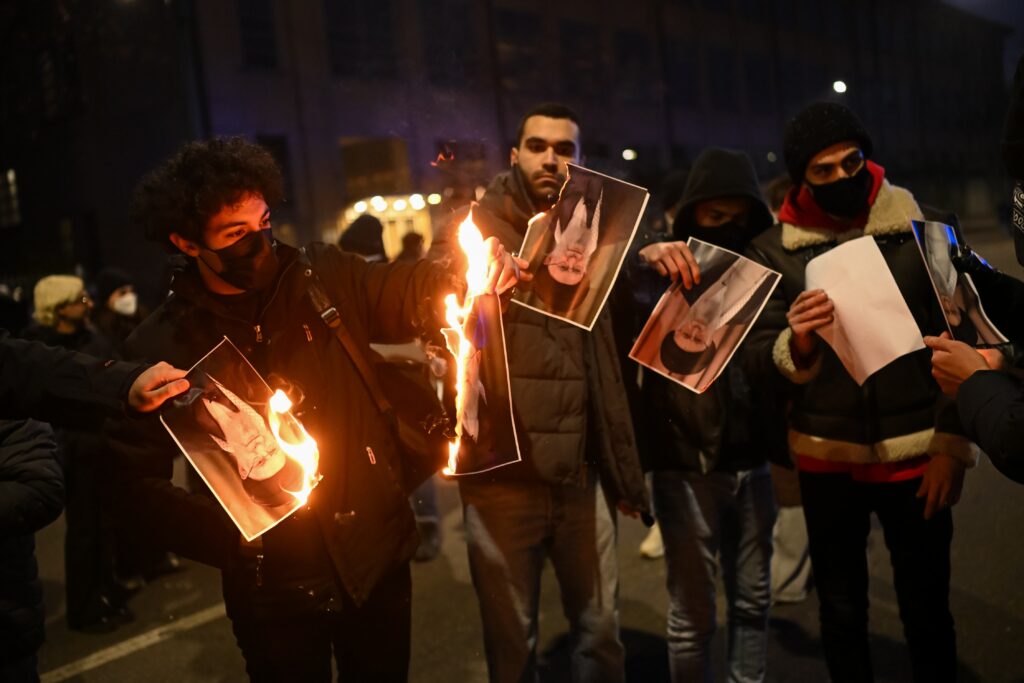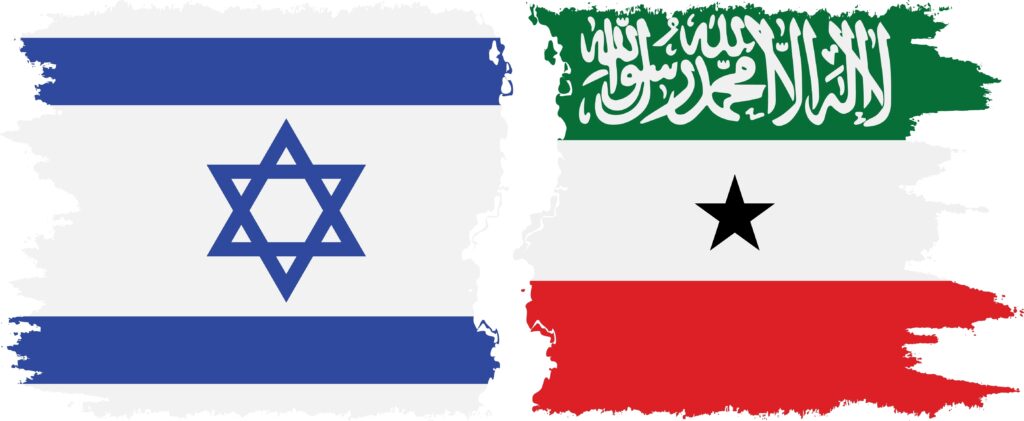UPDATES
“Arab Spring” Pessimism/ The Key Middle East trade-off
May 27, 2011

Update from AIJAC
May 27, 2011
Number 05/11 #08
While most Middle East observers have felt considerable hope in the wake of the “Arab Spring” mass movements, this has always been mixed with varying degrees of trepidation. Today, some very knowledgeable key analysts are increasingly saying that the trepidation now looks more appropriate than the hope. This Update is devoted to a few of these more cautious and pessimistic views about what is currently occurring across the region.
First up is Professor Barry Rubin, who predicts a major collapse of the Obama Administration’s policy hopes for the Middle East in September – not because of the Palestinian unilateral efforts at the UN, but because of the Egyptian elections. He predicts very a destructive and radical government in Egypt following that poll, and presents a variety of evidence to support his view. He then enumerates a number of dangerous problems he sees arising, and also raises other problematic trends across the region, including in Iran, Syria, Lebanon and Turkey. For this very strong exposition of the case for pessimism, CLICK HERE.
A less alarmed but also pessimistic view comes from a near legendary figure in Middle East studies, Professor Walter Laqueur. Drawing on his knowledge of the history and social science of other revolutions, he looks also primarily at Egypt and he predicts that despite the “revolutionary fairy tale” of Tahrir square, there will be no fairy tale ending. He points out that, economically, the prospects of states like Egypt, Syria and Yemen remain bleak, and there is little hope that this will change any time soon, despite the genuine inspiration the “Arab Spring” movement has seemed to offer. For all that this famous scholar has to say, CLICK HERE. British author and journalist Christopher Hitchens has also written about why he does not expect the Egyptian Revolution will end with democracy. Meanwhile, academic Eric Trager asks why the Egyptian army is standing by as disorder and violence mounts in Egypt.
Finally, Alan Dershowitz, the world-famous legal scholar, argues that US President Obama is still failing to recognise and encourage the central Israeli-Palestinian trade-off needed for the peace. That trade-off, he argues with the support of a Palestinian friend he quotes, is Israel conceding the “the 1967 lines with agreed-upon adjustments and land swap” in exchange for the Palestinians surrendering their demand for an impossible right of return to Israel proper. Dershowitz chides Obama for pushing only the Israeli side of the equation, without calling for Palestinian movement on the right of return, and even suggests some specific language Obama could use. For Dershowitz’s complete argument, CLICK HERE. Another valuable take on the overall reality of Israeli-Palestinian peacemaking comes from noted Israeli journalist and author Yossi Klein Halevi.
Readers may also be interested in:
- Top Israeli counter-terrorism expert Dr. Boaz Ganor looks at the Arab Spring from a counter-terrorist perspective.
- Following the last Update, Israeli PM Binyamin Netanyahu gave a speech to the US Congress which was very well received there. Some comment on this here, here, here and here.
- Netanyahu’s performance in Washington seems to have been popular back in Israel according to the latest poll, but as Barry Rubin and Evelyn Gordon both note, some major media outlets are claiming the opposite.
- Some other interesting overall takes on the various Middle East speeches and encounters featuring Obama and Netanyahu over the past week or so, here, here, here and here.
In September, Obama’s Middle East Policy Will Collapse
By Barry Rubin
Pajamas Media, 23 May 2011 01:58 PM PDT
Prediction: In September, President Barack Obama’s Middle East policy blows up in his (and our) face(s). It’s totally obvious and yet no one is focusing on it.
I’m not referring to the Palestinian Authority’s bid for unilateral independence at the UN. I’m referring to the Egyptian parliamentary election.
It is totally obvious that in that election Egypt will elect a radical, anti-American, hate-Israel parliament which will then write the country’s new constitution. This is a turning point in Middle East history. And Obama is unaware of it. Quite the contrary, he declared in his State Department speech that everything is great with the “Arab spring.” Nothing can go wrong. It is the expression of a yearning for prosperity and freedom.
The Arab spring began when a frustrated man in Tunisia set himself on fire.
It will now move to the new phase: the whole Middle East will be set on fire.
Is that alarmist? Not at all, except in the sense that when one sees a fire he sets off the fire alarm.
Don’t be distracted by the question of whether Islamists will have a majority or the even narrower question of whether the Muslim Brotherhood will have a majority.
There WILL be a radical majority, there MIGHT be an Islamist majority, there won’t be a Muslim Brotherhood majority but it will ALMOST CERTAINLY be the largest single party.
Why do I say this? Well, Amr Moussa, who isn’t an Islamist and is Egypt’s most popular and important Egyptian politician says so.
There is no sign—no sign—that the moderates are organizing serious parties. Instead of getting to work, they’re complaining. Meanwhile four radical, anti-American, passionately anti-Israel forces are organizing:
–The Muslim Brotherhood, which should get one-third or more of the seats and is contesting half of them, obviously in the districts where it has the best chance of winning.
–Smaller and even more radical Islamist parties (referred to as Salafists) who could form agreements with the Brotherhood so that they won’t hurt each other’s chances.
–Left-wing neo-Marxist parties.
–Radical nationalists.
There will probably be a number of independents who will be courted and won over by one of these blocs.
Imagine the day after that election. What will the mass media say? What will the American politicians say?
–That they were wrong about the Egyptian revolution and the Muslim Brotherhood?
–That by helping to bring down the old regime, U.S. policy foisted a disaster on the region and on its own interests?
–That by celebrating how great the “Arab Spring” is and refusing to acknowledge the real threats and problems, Obama made catastrophic errors.
–That his policy has led to many advances for America’s enemies?
–That Israel is in a far worse strategic situation and certainly can’t and shouldn’t make any more concessions?
–That the Islamists are emboldened and thus both Hamas and the radicals who run Fatah are taking an even harder line?
–That the loss of faith in America by its Arab allies is now undeniably clear and they are scrambling to make their own deals with Iran and other extremists?
–That there is a real possibility of a war in which Egypt either joins directly or backs Hamas? Imagine, Egypt stays “neutral” but nobody stops thousands of Egyptian volunteers from crossing into Gaza to fight or even across the Egypt-Israel border to launch terror attacks?
–What will the Obama Administration do if in practice Egypt tears up the Israel-Egypt peace treaty even if it pretends that it isn’t doing so?
–People are insisting that if Hamas in practice becomes part of the Palestinian Authority that the United States, and certainly Congress, will cut off aid. But what will happen when the Obama Administration does everything possible to prevent an aid cut-off and nothing possible to pressure the PA into changing its policy or behavior?
These are not speculations. These things WILL happen. Nobody in the United States or Europe is seriously discussing these scenarios and what should be done about them.
And I didn’t even mention the Egyptian presidential elections or, for that matter:
–An emboldened Turkish Islamist government if it wins the June 11 elections the:re,
–A Lebanese government controlled by Syria and its clients, especially Hizballah, if it ever gets a new prime minister and cabinet installed in that country.
–The survival of an anti-American Syrian government that has murdered hundreds of its citizens and will be arresting and torturing thousands, in part due to the Obama Administration’s failure to try to overthrow it?
–The sight of Iran ever closer to nuclear weapons and admissions that the sanctions had only a limited effect?
These are not far-out scenarios. All of them have a 90 percent or more likelihood of happening.
I don’t want to take your time here for a history lesson but consider precedents:
–1952. Radical regime takes power in Egypt. U.S. realizes the threat by April 1955 but then saves the regime from being overthrown by Britain, France, and Israel in 1956. Result: Violence, disruption, and anti-American problems in the region for decades.
–1979. Radical regime takes power in Iran. U.S. policy makes a mess in dealing with the revolutionary crisis. Americans taken hostage, revolutionary Islamism flourishes, thirty plus years of violence, September 11, Islamist movement still growing. By the way, why does not one of the hundreds of “experts” on television and in the mass media remember that the Iranian revolution began after President Jimmy Carter urged reform on the shah and ended with the United States calling on the shah to go away? Remind you of anything?
September 2011 will be another of those moments. Mark that on your calendar. On the tenth anniversary of the September 11 attacks, the United States will be watching the triumph of the ideology and movement–not Usama bin Ladin, of course, but his smarter counterparts–in much of the Middle East.
PS: Here’s an excellent guide to Egypt’s political parties so far which proves my point . Note that there isn’t a single serious moderate party. Amr Mousa isn’t forming a party while Muhammad ElBaradei, Obama’s favorite, isn’t doing anything but complain. There is a “Facebook party.” So far it has 1000 “likes.” Egypt has about 85 million people.
Barry Rubin is director of the Global Research in International Affairs (GLORIA) Center, editor of the Middle East Review of International Affairs (MERIA) Journal, and a featured columnist at PajamasMedia http://pajamasmedia.com/barryrubin/ His latest books are The Israel-Arab Reader (seventh edition), The Long War for Freedom: The Arab Struggle for Democracy in the Middle East (Wiley), and The Truth About Syria (Palgrave-Macmillan). The website of the GLORIA Center is http://www.gloria-center.org. His PajamaMedia columns are mirrored and other articles available at http://www.rubinreports.blogspot.com/.
Back to Top
————————————————————————
Another Revolution Betrayed
IT IS DIFFICULT to predict revolutions. George Rude, the leading left-wing historian of the French Revolution once wrote that an intelligent observer of the French scene, native or foreign, would hardly have predicted in 1787 the coming of the revolution despite a variety of straws in the wind. There was probably no closer student of France at the time than Arthur Young, the leading British expert on agriculture, who visited France three times for extended periods on the eve of the revolution. While he saw a number of things that were wrong with the country, he certainly did not realize that a great revolution was coming.
Not as unusual as one might think. In Russia, there was no more ardent a protagonist of the revolution than Vladimir Ilich Lenin, who had devoted his whole life to the cause. And yet Lenin, in a lecture in Bern in January 1917, was quite pessimistic about the prospects of the masses rising up, telling his audience that the great event might not even happen in his lifetime. But it did happen just one month later. And by the end of the year, his party, the Bolsheviks, had taken power.
In our age it seems to have become even more difficult to make these sorts of predictions, perhaps because there has not been a revolution for a long time. The term is bandied about rather freely and carelessly. When I was asked many years ago to prepare the entry “revolution” for the Encyclopedia of the Social Sciences there was broad agreement that a revolution was something sui generis; today it seems to have become a synonym for rebellion, coup d’etat, mutiny, uprising and half a dozen other forms of upheaval. All too often we forget a once generally-accepted principle: namely that a true revolution involves a number of preconditions.
First, there is the spark needed to trigger the uprising. In 1917 it was a strike in Petrograd; the revolution in Munich in 1848 broke out because an umbrella had fallen (or was thrown down) from the top seats of a theater and the public mistook the noise for a gunshot; in Brussels in 1830 the performance of a romantic opera (La Muette de Portici) in which the aria of Masaniello, a Napolitan fisherman, denounced the injustices which had been committed by the Spanish Habsburg rulers, led to the division between Belgium and Holland.
In the case of the Arab awakening of 2011, 46-year-old policewoman Fedia Hamdi struck Mohamed Bouazizi, a Tunisian stallholder in a market, and in protest he burned himself alive. But there was enough tension and discontent within the country—and in particular with Zine el-Abidine Ben Ali—that had it not been for the unfortunate Bouazizi, some other incident might well have caused the overthrow of the regime.
Next, for a revolution to succeed, it needs a revolutionary movement capable of making use of it. And unless the party in power, the establishment, has been greatly weakened—lost its self-confidence and the popular support on which it rests—the revolutionary movement may still be defeated. Extreme and efficient dictatorships—such as that of Hitler or Stalin—leave no room for maneuver. Even in the case of Tsarist Russia it took a lost war (1904/5) and three years of heavy losses (close to two million killed) in another to bring about a revolution. Tocqueville observed that a dictatorial regime faces the greatest danger when it is trying to reform itself.
WHY, THEN, WERE Mubarak and Ali ousted so easily while other dictators are putting up a more determined resistance? Largely because they had stayed in power for too long and had become soft and lazy. That Mubarak’s regime was corrupt and a dictatorship is beyond doubt. But it was in all probability not the most corrupt, just a little bit worse than the Middle Eastern norm. Those who claim that Mubarak stole seventy billion dollars seem not to know the difference between a million and a billion; it would have made him the richest or the second richest man in the world. So far all that has been found is one apartment in London’s Knightsbridge; no doubt more accounts and properties will be discovered. True, those in power might have stolen a little more than customary, but probably less than Qaddafi. Egypt’s overall economic balance sheet these last few years had been quite positive (in contrast to that of Syria). True, not enough had trickled down and, above all, the rulers had not conveyed the impression that their states were moving forward. But the general climate of corruption in Egypt generated envy and hatred primarily because it lasted too long.
Mubarak’s dictatorship was not the most cruel and repressive, for if it had been it is unlikely that a book like The Yakoubian Building (and the movie based on it) could have been published, depicting quite realistically all the social ills besetting contemporary Egypt. It is also unlikely that a leading public intellectual like Tariq al-Bishri would have been able to publish his bitter attacks against the state.
These were old-fashioned authoritarian states without a populist ideology and without a well-oiled propaganda machine. Some have defined the Egyptian regime (and some others in the Middle East) as “Sultanist.” A term popularized by Max Weber, it connotes a despotic and unpredictable regime in which everything depends on one person, the ruler. But Mubarak’s sway was by no means unlimited nor was it unpredictable.
Under Gamal Abdul Nasser life in Egypt was far more repressive and many more people were jailed and killed. He ruined Egypt’s economy and suffered a crushing defeat in the war against Israel. Yet in this case, the prerequisites for a revolutionary situation were not in place. Many Egyptians admired him. Had he not brought dignity and pride to their country and enhanced its standing in the world? If he had not died from a disease, he might have ruled Egypt for many more years.
WHEN THESE LEADERS fell, the Western media joyously proclaimed the end of an era. When the demonstrations began in late January in Tahrir Square in Cairo, exhilaration grew by the hour not only among the participants but also among the journalists who had hastened to Egypt from all parts of the globe. Tahrir Square, they reported, was the most exhilarating place in the world, the atmosphere was intoxicating, uplifting, elating, entrancing, electrifying.
In the words of the poet (at the time of the French revolution) bliss was it to be alive. It was a sweet, peaceful and leaderless revolution, a million Egyptians or more were all brothers and sisters now. It was a show of incredible strength, it was an infectious source of inspiration. The alarmists had been proved dismally wrong, everything would be different in the future, a return to the bad old days was impossible. No one wanted the Muslim Brotherhood to take over and the few voices shouting Brotherhood slogans such as “Allahu Akbar” were quickly drowned out.
Who could stand aside when the young people of this old country, suddenly feeling a sense of pride, demanded freedom and dignity? It was truly amazing how this new generation had used the Internet, Facebook and Twitter to mobilize huge masses. Was it not the beginning of a new age, did the events of the Arab Spring (or Awakening or Revolution) not have worldwide historical implications? Were they not bound to affect many other countries suffering from repression? Was it not the beginning of a global revolution?
The heady spirit of the first days and weeks of Tahrir will no doubt find its chroniclers. It was the storm of the Bastille in the Arab world, the Gdansk moment, the dismantling of the Berlin Wall.
It was wonderful while it lasted.
EGYPT’S REVOLUTIONARY YOUTH became less happy as time went by. They wanted real change, not just the removal of the pharaoh, his sons and his clan. They were unhappy with the military, which quite obviously did not share their revolutionary enthusiasm, instead wanting above all to restore order and normalcy. They demanded that power not remain in the hands of the army—but to whose hands it should pass was not quite clear. The military was happy to oblige in the meantime; there would be elections in six months, not a day later. A committee was going to deal with minor changes in the constitution. And yet there were warning signs that not all was going to work out quite so well: There was not a single woman among the members of the committee and it was headed by Tariq al-Bishri, who had so vehemently and eloquently elucidated the problems with the Mubarak regime—formerly a Communist fellow traveler, now a Muslim Brotherhood sympathizer. This meant that the famous second paragraph of the constitution concerning shari’a as the law of the land would certainly not be abolished (as liberals had demanded). Whether harshly or leniently enforced, this means no greater freedom for women and minorities—that is to say for 60 percent of the population.
Though the young revolutionaries had demanded free elections, the more farsighted among them very quickly realized that they had little public support, so free elections would not give them what they wanted. The Muslim Brotherhood would get about 40-45 percent of all parliamentary seats, and together with some smaller Islamist groups and Islamist “independents,” the liberals would certainly find themselves in the minority. And even if the Islamists failed to win, the Wafd, Egypt’s traditional nationalist secular party, announced that it would be happy to cooperate with the Brotherhood. The army, which could then maintain power in the background, would be perfectly content with such an outcome.
Slowly, the true state of affairs and the not-so-sanguine prospects began to dawn on foreign observers and commentators. Some had their misgivings from the beginning, remembering Foucault’s misguided enthusiasm about Khomeini and the Iranian revolution. But, they argued, Cairo was not Tehran—which is indeed undeniable. Articles began to appear arguing that revolutions are never easy, straightforward affairs, that there might be setbacks on the way to freedom and democracy, that Egypt faced serious social and economic problems. As life in Cairo returned to normal and demonstrators vacated Tahrir Square, press coverage turned summarily pessimistic: Had the revolution perhaps been defeated? The results of the interim elections seemed to point that way, for the great majority did not support the liberals and democrats. The revolutionaries and their well-wishers who had always been so enthusiastic about theirs being a leaderless movement seemed to ignore that never in history had such a leaderless movement succeeded. Great believers in the political power of modern technology, they disregarded the fact that while texts and tweets can promote democracy they can also teach how to make bombs.
The prospects in these countries remain bleak. Economically, states like Egypt, Syria and Yemen are riddled with poverty and plagued by rapidly increasing populations. Any sense that they will move in the direction of Turkey is greatly exaggerated. With so many educated young people unable to find jobs commensurate with their education, radicalization seems far more likely than democratization.
It was easy to be infected by the high spirits of the masses demonstrating in Tahrir Square in the early days. The Middle East, particularly the Arab world, has been for so long the problem child in world affairs, the source of endless worries, the focus of tensions and dangers to peace. Here at long last was the chance—nay, the certainty—that this part of the world had found its way out of backwardness and repression to greener pastures. Visions of a better world were irresistible: the bad guys defeated, the good guys triumphant. And all this without a single shot fired, simply by the enthusiasm of an idealistic young generation. It was a revolutionary fairy tale.
But there will be no fairy-tale ending in our time.
Back to Top
————————————————————————
Obama Explains – And Makes It Worse
by Alan M. Dershowitz
Hudson Institute, May 25, 2011
In his press conference with Prime Minister David Cameron in London on Wednesday, President Obama explained his thinking as to why he insisted that the first step in seeking a peaceful two-state solution between Israel and the Palestinians must be an agreement by Israel to accept the 1967 borders with mutually agreed-upon land swaps. Here is what he said:
“It is going to require wrenching compromise from both sides. In the last decade, when negotiators have talked about how to achieve that outcome, there have been typically four issues that have been raised. One is the issue of what would the territorial boundaries of a new Palestinian state look like. Number two: how could Israel feel confident that its security needs would be met? Number three: how would the issue of Palestinian refugees be resolved; and number four, the issue of Jerusalem. The last two questions are extraordinarily emotional. They go deep into how the Palestinians and the Jewish people think about their own identities. Ultimately they are going to be resolved by the two parties. I believe that those two issues can be resolved if there is the prospect and the promise that we can actually get to a Palestinian state and a secure Jewish state of Israel.”
This recent statement clearly reveals the underlying flaw in Obama’s thinking about the Israeli-Palestinian conflict. There is no way that Israel can agree to borders without the Palestinians also agreeing to give up any claim to a “right of return.” As Palestinian Prime Minister Salaam Fayyed once told me: each side has a major card to play and a major compromise to make; for Israel, that card is the West Bank, and the compromise is returning to the 1967 lines with agreed-upon adjustments and land swaps; for the Palestinians, that card is “the right of return,” and the compromise is an agreement that the Palestinian refugees will be settled in Palestine and not in Israel; in other words, that there will be no right to “return” to Israel.
President Obama’s formulation requires Israel to give up its card and to make a “wrenching compromise” by dismantling most of the West Bank settlements and ending its occupation of the West Bank. But it does not require the Palestinians to give up their card and to compromise on the right of return. That “extraordinarily emotional” issue is to be left to further negotiations only after the borders have been agreed to.
This temporal ordering – requiring Israel to give up the “territorial” card before the Palestinians even have to negotiate about the “return” card – is a non-starter for Israel and it is more than the Palestinians have privately asked for. Once again, President Obama, by giving the Palestinians more than they asked for, has made it difficult, if not impossible, for the Palestinians to compromise. Earlier in his administration, Obama insisted that Israel freeze all settlement building, despite the fact that the Palestinians had not demanded such action as a precondition to negotiating. He forced the Palestinians to impose that as a precondition, because no Palestinian leader could be seen as less pro-Palestinian than the American President. Now he’s done it again, by not demanding that the Palestinians give up their right of return as a quid for Israel’s quo of returning to the 1967 borders with agreed-upon land swaps.
So it’s not so much what President Obama said; it’s what he didn’t say. It would have been so easy for the President to have made the following statement:
“I am asking each side to make a wrenching compromise that will be extraordinarily emotional and difficult. For Israel, this compromise must take the form of abandonment of its historic and Biblical claims to what it calls Judea and Samaria. This territorial compromise will require secure boundaries somewhat different than the 1967 lines that led to war. Resolution 242 of the Security Council recognized the need for changes in the 1967 lines that will assure Israel’s security. Since 1967, demographic changes have occurred that will also require agreed-upon land swaps between Israel and the new Palestinian state. This territorial compromise will be difficult for Israel, but in the end it will be worthwhile, because it will assure that Israel will remain both a Jewish and a fully democratic state in which every resident is equal under the law.
“For the Palestinians, this compromise must take the form of a recognition that for Israel to continue to be the democratic state of the Jewish people, the Palestinian refugees and their descendants will have to be settled in Palestine. In other words, they will have a right to return, but to Palestine and not to Israel. This will be good both for Palestine and for Israel. For Palestine, it will assure that the new state will have the benefit of a large and productive influx of Palestinians from around the world. This Palestinian diaspora should want to help build an economically and politically viable Palestinian state. The Palestinian leadership must recognize, as I believe they do, that there will be no “right of return” of millions of Palestinian refugees and their descendants to Israel. Compensation can be negotiated both for those Palestinians who left Israel as a result of the 1948 wars and for those Jews who left Arab countries during and after that same period.”
It’s not too late for President Obama to “explain” that that is what he really meant when he declared that Israel must remain a Jewish state and that any Palestinian government that expects compromises from Israel must recognize that reality. Central to Israel’s continued existence as the nation-state of the Jewish people is the Palestinian recognition that there can be no so-called “right of return” to Israel, and that the Palestinian leadership and people must acknowledge that Israel will continue to exist as the nation-state of the Jewish people within secure and recognized boundaries. Unless President Obama sends that clear message, not only to the Israelis but to the Palestinians as well, he will not move the peace process forward. He will move it backward.
Tags: Israel





